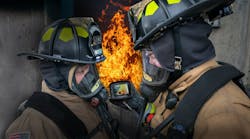Fire dispatchers have always had to prepare for emergencies. Calls where vast quantities of hazardous materials are involved, citizens are trapped above a working fire and firefighters calling a Mayday can all be counted in this realm. However, until recently, fire dispatchers did not expect to encounter units coming under fire and firefighters being taken hostage to this list. Unfortunately, these two events now can be included in the mix.
In the September 2012 issue of Firehouse®, I discussed the management of active-shooter incidents in the generic sense. In this column, I address the taking of firefighters as hostages directly.
The first indication that the Gwinnett County, GA, Communications Center had that something was amiss with what seemed to be a routine medical call came when responders activated their emergency buttons. This was soon followed by this radio message: “Engine 10 to Radio, we have a situation with an armed person where he is requesting certain utilities to be turned back on at his house, and he is armed and we are in the room with him.”
Seventeen-year veteran Communications Manager Carrie Bennett was listening to radio traffic and came to the operations floor to assist. One of her first actions was to notify the fire department command staff to brief them on the situation. When dispatchers queried the crew whether the firefighters were free to leave, they received the terse response, “Negative.” To help manage the situation, fire department talk groups as well as the one assigned to the SWAT team were closely monitored. At this point, the duration of the incident was unknown, so plans were made for a protracted operation. Off-duty dispatch personnel were called in to augment staff and others reported voluntarily when they heard the news break. And breaking news can place an extra burden on an already severely taxed communications center.
According to Bennett, “Calls of this nature gather international attention. We received calls not only from local media, but from reporters nationwide once the story hit the Internet. Having a public information officer inside the center would have been beneficial.” Also of benefit was the fact that the incident from start to finish lasted approximately three and a half hours. (Compare this to a situation in Alabama where a child was held captive for six days.) Also, remember that other calls do not stop in the presence of a serious event. The dispatchers in Gwinnet had to deal with day-to-day operations while the hostage crisis unfolded.
Like many, if not most, dispatch centers, Gwinnet had no specific policy and procedure dealing with the taking of first responders hostage. On-duty personnel on both sides of the microphone handled the situation professionally based on experience and common sense.
The following suggestions may be of assistance should you face a similar dilemma:
• Determine the number of personnel taken hostage. In career departments, this may be as simple as checking the riding sheet. In volunteer department, the station parking lot and scene must be canvassed for members’ vehicles to get an approximation.
• Remember that the hostage taker may have a scanner or at least access to the portable radio of one of the hostages. Radio traffic should proceed accordingly.
• Although secondary to the safety of the hostages, coverage for the company or department must be ensured. Move-ups, fill-ins or mutual aid must be instituted.
• Make the required notifications. If no specific policy for these incidents exists, follow those for firefighter injury or death. If these are also lacking, notify the chief or ranking officer on duty.
• Upon learning of the situation, immediately advise law enforcement. Relay all pertinent information, which includes, but is not limited to:
- Exact location
- Additional features (house, apartment, commercial occupancy)
- Name and telephone number of caller
- Current duration of incident
- Number/condition of hostages (may also include civilians)
- Type and number of weapons, if known
- Demands and/or threats made
• If contact is made directly with the hostage taker, attempt to keep him or her on the line. Try to establish a rapport. If your agency has a policy for handling suicidal callers, some of the same skills may be used here.
• If direct contact is maintained, arrange for a trained hostage negotiator to take over the call, either by reporting to dispatch, or through a three-way patch.
• If possible, have a public information officer report directly to the center to handle media calls. Ensure that a single story is consistently told and make sure that no information is released that could potentially harm the hostages.
• Do not release information regarding the identity of the members of service involved prior to the notification of their families, if at all. This includes posting on social media sites, instant messages and Tweets.
• Remember that Gwinnet had at least limited radio contact with the hostages throughout the incident. This may not always be the case, so any piece of information gathered may be critical. Be sure that constant lines of communication remain open between the fire department and the law enforcement agency in charge, and that a continuous exchange of information is maintained.
• Remember, too, that while the hostage taker lost his life in this scenario, that the firefighters survived with no serious physical injuries. This may not always be the case. Unfortunately, your plan must also include this contingency.
• Upon conclusion, hold a debriefing. Provide stress counseling, as applicable.
These are just a few suggestions for things to consider when dealing with firefighter or medic hostage situations. Local policies and regulations will obviously serve as a base from which to build. Dispatch centers are now figuratively under the gun to create standard operating procedures (SOPs) to deal with this possibility. Now is the time to act, before your first responders are literally under the gun.






